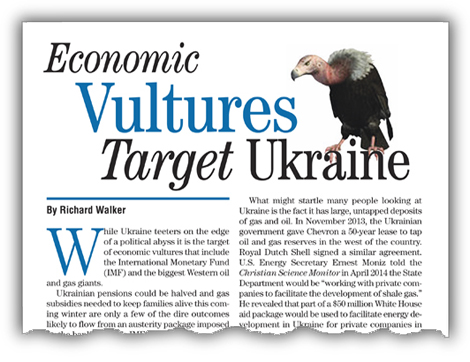
By Richard Walker —
While Ukraine teeters on the edge of a political abyss it is the target of economic vultures that include the International Monetary Fund (IMF) and the biggest Western oil and gas giants.
Ukrainian pensions could be halved and gas subsidies needed to keep families alive this coming winter are only a few of the dire outcomes likely to flow from an austerity package imposed by the bankers at the IMF.
When the IMF announced its Ukraine bailout in March 2014, the deal should have come with a warning label.
As a rule, when the IMF offers to help a debt-ridden country, it demands austerity measures that have little to do with resurrecting a nation’s economic fortunes and more to do with bailing out bankers and strangling its economy. With its loans come large bills for the dispersal and monitoring of the money it lends. In the case of Ukraine, a loan of $21 billion has a $6.2 billion charge for “debt servicing.”
Author and commentator Dr. Jack Rasmus fears the IMF’s loan will be used by Ukraine’s central bank to stabilize its currency reserves. Billions of dollars will be shared with businesses that will hoard them. He has a stark warning for those, who mistakenly believe the bankers and multinationals of the Eurozone will pay Ukraine’s bills. In his view, bringing Ukraine into the Eurozone will be akin to “adding another Greece or Spain to the mix.”
“Those who will pay will be the Ukrainian people,” warned Rasmus. “That is the essential and repeated history and legacy of IMF deals globally for the last three decades.”
One way Ukrainians will undoubtedly pay is through the high cost of imports from the Eurozone that will be made even more expensive by the fact that Russian companies will be denied offering their goods to Ukraine at competitive prices.
What might startle many people looking at Ukraine is the fact it has large, untapped deposits of gas and oil. In November 2013, the Ukrainian government gave Chevron Corporation a 50-year lease to tap oil and gas reserves in the west of the country. Royal Dutch Shell signed a similar agreement. United States Energy Secretary Ernest Moniz told the Christian Science Monitor in April 2014 the State Department would be “working with private companies to facilitate the development of shale gas.” He revealed that part of a $50 million White House aid package would be used to facilitate energy development in Ukraine for private companies in the West.
But there is a bigger energy picture worth noting. Western energy corporations have had their eyes on Ukraine’s reserves for decades. That was clear from a December 19, 1996 report from The Moscow Times, in which Canadian geologist Mike Monea expressed surprise at the amount of untapped energy in Ukraine. He conceded it had been a well-kept secret.
“I’m a geologist and was very surprised at the extent of oil deposits,” he said. “They’re numerous. The information has never been published in geological circles. They never let it be known.”
Ukraine is incapable of developing its own natural resources. Russian President Vladimir Putin has threatened to force Ukraine to pay in advance for deliveries of natural gas.
Now, with the push to move Ukraine closer to Europe, its untapped energy resources will be exploited by the very people claiming to come to its aid at the expense of Ukrainian citizens.
Richard Walker is the pen name of a former N.Y. news producer.


